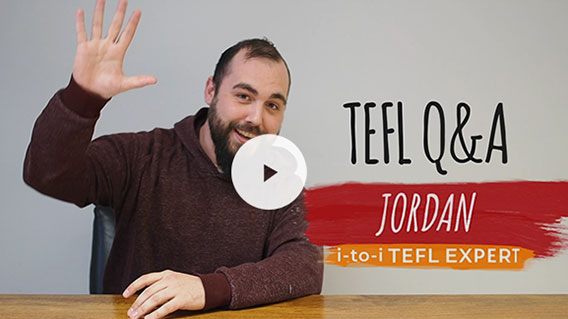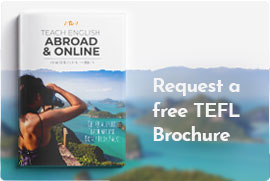The beginner’s guide to what’s what in TEFL
What is a TEFL qualification? How do you get a TEFL certificate? Come to think of it, how do you actually become a TEFL teacher? In fact, let’s go back a step – what does TEFL even stand for? If you are confused and bemused, here is our Beginner’s Guide to What’s What in TEFL (otherwise know as Frequently Asked Questions About TEFL – plus the answers to go with them).
What is TEFL?
TEFL stands for Teaching English as a Foreign Language.
Technically it refers to teaching English in a country where English is not the official language. However, it is often used as a catch-all term for teaching English to any non-native English students, wherever they are based.
To find out more about what this means in practice, read our article What is TEFL?

What is a TEFL course?
A TEFL (Teaching English as a Foreign Language) course trains people to teach English to students who live in a country where English is not the official language.
There are a number of different types of courses, including introductory courses, 120 hour certificate courses (the main entry-level qualification for paid work overseas), specialised courses such as those for teaching young learners or teaching one-to-one lessons, and advanced courses such Masters degrees and diplomas.
Read our article What is a TEFL Course? to decide which type of TEFL course is right for you.
What is a TESL course?
TESL stands for Teaching English as a Second Language. A TESL course trains people to teach English to students who live in an English speaking country but do not speak English as their first language.
What is a TESOL course?
TESOL stands for Teaching English to Speakers of Other Languages. A TESOL course trains people to teach English to non-native English speakers.
In theory the term TESOL encompasses TEFL (Teaching English as a Foreign Language) and TESL (Teaching English as a Second Language). However in some English speaking countries, such as the USA, TESOL can be used in place of TESL to refer to English language teaching in a country where English is the official language.

Should I do a TEFL, TESL or TESOL course?
TEFL, TESOL and TESL courses tend to be broadly similar in level and content – and the terms are often used fairly interchangeably. If you are planning to teach overseas, the fact that you have a certificate in TEFL rather than TESOL (or vice versa) is unlikely has much impact on your chances of getting a job. The course provider, level of certificate and content you cover is more likely to be significant.
If you want to teach English in a country where English is the official language however then consider taking a TESOL or TESL course rather than a TEFL course. Technically TEFL (Teaching English as a Foreign Language) focuses on teaching English to students in countries where English is not the official language and some English speaking countries, such as the USA, do make this distinction.
If you plan to teach across the world, focus on finding the course that you think will provide you with the highest quality training and value for money regardless of its specific title. Once you have some good teaching experience under your belt, the precise nature of your qualification is less likely to be important than the references you can provide.
What is a TEFL qualification?
A TEFL qualification is a qualification in Teaching English as a Foreign Language. You will normally be awarded a TEFL qualification after you have successfully completed an accredited TEFL course and passed any associated tests or tasks.
The main entry-level qualification for paid work in TEFL is an accredited 120 hour TEFL certificate course. However TEFL qualifications come in many shapes and sizes – from a certificate of attendance at an introductory course right through to a Masters in English Language Teaching.
Read our article What is a TEFL Course? to find out more about different types of TEFL courses and qualifications.
What is a TESOL qualification?
A TESOL qualification is a qualification in Teaching English to Speakers of Other Languages. You will normally be awarded a TESOL qualification after you have successfully completed an accredited TESOL course and passed any associated tests or tasks.
A TESOL qualification is broadly similar to a TEFL qualification in terms of content and levels.
If you plan to teach English in a country where English is the official language then consider taking a course that leads to a TESOL rather than a TEFL qualification.
What is CELTA / CertTESOL?
The Cambridge CELTA (Certificate in English Language Teaching to Adults) and the Trinity CertTESOL (Certificate in Teaching English to Speakers of Other Languages) are specific “brands” of entry-level TEFL certificates – and probably the most widely recognised internationally.
Is it worth paying for a CELTA / CertTESOL course?
If you are considering a career in TEFL, the CELTA / CertTESOL courses can be a sound investment. However, they are at the top end of the price range (anything from £1,000 upwards) and so can be prohibitively expensive for some wannabe teachers. If you simply want a way to fund your travels, a good quality 120 hour certificate course is likely to provide you with all you need to find that all-important first job.
Read our article What is a TEFL Course? to find out more.
What is Delta?
Delta is an advanced TEFL qualification. You generally will need to have a minimum of two years’ suitable teaching experience before you can apply to do a Delta.
If you want to work in TEFL long term, then it is worth considering taking the Delta qualification.
How do I get a TEFL or TESOL certificate?
To get a TEFL (Teaching English as a Foreign Language) or TESOL (Teaching English to Speakers of Other Languages) certificate (or even to become “TEFL certified” as some put it) you will need to complete an accredited TEFL or TESOL course and pass the associated tests set by the provider.
This remains pretty much the same, whether you want to get a TEFL / TESOL certificate in the UK, South Africa, Australia or anywhere else in the world – although your local training providers may vary.
If you have completed your course online, you may get your TEFL / TESOL certificate online also – in some cases with an option to pay for a hard copy. Your training provider should provide clear information about how you will receive your certificate at the end of your course.
How much does a TEFL / TESOL course cost?
The price of a TEFL (Teaching English as a Foreign Language) or a TESOL (Teaching English to Speakers of Other Languages) course can vary between around £100 – £3,000 depending on the level of course you choose, the provider that delivers it and whether you do it online or in a classroom.
As a rough guide:
- Introductory courses cost between £100-£300
- Accredited 120 hour TEFL certificate courses cost between £100-£400
- CELTA or CertTESOL courses cost between £1,000-£2,000
- Delta courses cost between £1,500-£3,000.
Take a look at our article How Much Does a TEFL Course Cost? for tips to help you find a suitable course.
What qualifications do I need to become a TEFL teacher?
To get a reasonable, paid job as a TEFL teacher, you will generally need:
- To speak and write English fluently. Some countries or jobs may require you to be a native English speaker
- A TEFL certificate from an accredited provider, proving that you have successfully completed a 120 hour TEFL course, as a minimum
- A degree. This tends to be a requirement for visas, rather than anything to do with TEFL, so the fact that you have a degree matters more than the subject it is in. In some countries this is mandatory, in others it is less important – though it still will not do you any harm to have one
- A positive, can-do attitude.
Find out more in our article What Qualifications Do I Need to Take a TEFL Course?
How do I become a TEFL teacher?
Once you have got your TEFL qualification, there are a number of different approaches you can take to finding a job:
- Online jobs’ boards on sites such as tefl.com, www.i-to-i.com/tefl-jobs-abroad/ and www.eslcafe.com are great places to start your search
- Contacting schools direct can be a good way of targeting your search and making your application stand out. However, it is time-consuming and usually means that you will need to organise all the paperwork yourself
- Recruitment agencies can be the most straightforward way of finding your first job. As schools are generally located in a different country from their potential teachers, recruitment agencies are common in the TEFL industry
- Internships provide on-the-job experience, rather than paid work. However, they can be a useful way to build up your CV and contacts.
Can I be a TEFL teacher if I am not a native English speaker?
Yes, it is possible to be a TEFL (Teaching English as a Foreign Language) teacher if you are not a native English speaker. However, even if you can speak and write English fluently, your options will be limited and you will need to work harder to find a job.

Take our 2-minute teaching online quiz to find out if you're eligible to start earning from home as an online English tutor!
Related FAQs
Additional help

GET YOUR TEFL DISCOUNT
Simply pop your details below to receive your exclusive discount code.
